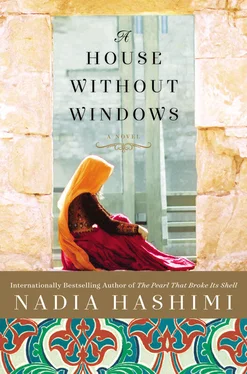Gulnaz wanted to put her arms around her daughter, to feel her face against her own. She wished she could have done more too. She knew she should have pushed harder, found out what her troubling dreams meant and followed her instincts. There were so many things she could have done.
“Zeba,” Gulnaz said with a heavy sigh. “I’ve held so many grudges, I’m surprised I can still get up and walk. I’m not going to hold one against my own daughter. Anyway, this isn’t the right time for pity or blame. You did what you thought was the best thing for your family, just as I did.”
Zeba nodded. The tightness in her throat began to release.
“You’re in a whole lot of trouble, Zeba. Murder is no small charge. Let’s keep our eyes forward, eh? You’ve met with the lawyer Rafi sent for you?”
“Yes,” Zeba said.
“And?”
“God bless my brother,” Zeba said shaking her head. “I know he feels he needs to look after me because I’m his sister and now I’m. . I’m a widow. The lawyer he hired is a boy, a young, naïve boy who thinks he can save me. But the stones of retribution will come my way. It’s just a matter of time.”
“Rafi said good things about this lawyer. They both want to help you, but they are men, and men can often only see what they can hold in their hands. The world is made of rocks and wood and meat for them. It’s not their fault; it’s how they were designed.” Gulnaz sighed. “We cannot leave everything in the hands of men. I made that mistake once, and I won’t make it again.”
Zeba looked back. She saw Latifa lean across the table and say something to the two younger women. She could imagine the wild speculations they were making about Gulnaz. She turned back to her mother.
“And women?” she asked thoughtfully. “What is the world to us?”
Gulnaz offered a meek smile.
“Do you not know, my daughter? Our world is the spaces between the rocks and meat. We see the face that should but doesn’t smile, the sliver of sun between dead tree branches. Time passes differently through a woman’s body. We are haunted by all the hours of yesterday and teased by a few moments of tomorrow. That is how we live — torn between what has already happened and what is yet to come.”
Zeba’s eyes glazed. Her mother’s voice soothed her as it probably had when Zeba could still be cradled and rocked to sleep. She would save these words, she knew, and consider them more carefully at another time. Zeba’s mind darted back to something else Gulnaz had said just a moment ago.
“What did you mean before? What mistake did you make?”
Gulnaz’s face was drawn, solemn. She looked at her daughter squarely.
“I have no reason to hide anything from you. You’re not a child any longer.”
Zeba waited.
“Your father. When we were first married, he knew about my habits, the things I could do to bend the winds. He found it endearing. He would smile and watch, but in truth, he thought my concerns were exaggerated. He told me I was smelling smoke when there was not even a glint of fire.”
Zeba felt uncomfortable, hearing about the conversations between her parents as husband and wife. It felt inappropriate.
“I was young, of course. I wanted to make your father happy. And maybe part of me was tired of keeping up such a guard. I let my walls come down. We spent more time with the family, with friends. Things were bad at that time, of course. War and bloodshed and scarcity all over the country. We were not that different. We struggled just like everyone else. You remember, I’m sure. We couldn’t hide the ugliness from you and your brother.
“I told myself a lot of bad things were happening to everyone, not just us. I tried talking myself out of thinking I was the target of any evil thoughts. I tried very hard.”
Zeba stared at her mother’s hands. Her fingernails were peeling at the tips and there were tea-colored spots where Zeba didn’t remember seeing any before. The years that did not show on Gulnaz’s face were quite obvious on her hands. It pained Zeba to see it.
“In truth, we were no worse off than anyone else. If you and Rafi were hungry, other children were surely starving or dead. I was beginning to think maybe your father was right. Maybe I was overly sensitive and creating my own problems. I put all my jadu aside and felt, for once, as if the weight of a thousand stones had been lifted from my shoulders. Even when my own mother died, I did not falter. I did not blame anyone. I told myself she was on in her years and that was the road for all of us, sooner or later. I lived that way, my eyes blinded by your father who saw nothing, least of all that which was in front of him.”
Zeba was surprised to hear there had been a time when her mother had turned away from jadu .
“Madar- jan, I cannot remember a single day when I did not see you busy with some kind of spell. It was with you from the moment you woke up in the morning.”
“Not always. I did what I did only when I needed to.”
Zeba grew pensive.
“Why did my father go off to fight? No one else in the family did.”
Gulnaz clucked her tongue and looked away. Her eyelids fluttered at the memory of that time. She spoke about him not as one speaks of the dead, but also not as one speaks of the living. That was the purgatory Zeba’s father had always lain in.
“I cannot explain your father’s thoughts. He didn’t really share them with me. That man — wherever he is may he be at peace — was an unreasonable man. He followed his own compass. I had no hand in swaying him. He used to listen to that old Russian radio, that block of wood with the brass dials, and curse into the night. Then, one day, he just left. He walked out the door and never came back.”
Zeba sat motionless.
“Did he not say where he was going or who he was going to fight with? Did no one ever say they had seen him in the fighting? So many dead were returned to be buried near their families.”
“And plenty more were absorbed by the land they fought for. We’ll never know, Zeba, and it’s useless to think about it now. You have much more important matters you should be concentrating on.”
“Did you not ever think he might come back?”
Gulnaz scowled.
“I used to expect him to walk through the door. Maybe next Friday, to return for Jumaa prayers. Or maybe in two weeks. Then I thought he might return for the Eid holiday, thinned from a month of fighting and fasting. Then the Russians were gone. I waited again, but there was no sign of him. And then the fighting started again, and I told myself he’d dug himself back into it.”
The civil war had meant there would be no peace even after the Russians had retreated. How could there be when the ethnic diversity of Afghanistan — barbed-wire distinctions and deep-rooted resentments — resurfaced? It was as if Afghanistan had been folded up into itself at the borders. Without a common outside enemy, they turned on one another.
“Finally, I wondered if he would come before Rafi was married. I told myself that if he didn’t return by Rafi’s wedding, then he was surely dead. War or no war, how could a father not be present for his son’s wedding?”
“But if he hadn’t known about the wedding. .”
“By then I was tired of making excuses. I counted him among the dead and so did you.”
It was true. When she cupped her hands in prayer, she always asked God to keep her father in heaven’s gardens. It had been the safest assumption given the war’s death toll.
“I kept his clothes at the house. There was always a place for him in case he did return. And I wept sometimes to see the emptiness where your father should have been, but they were bad times for us, too, and I had to think of you. I had two children to feed and only my sewing kept us alive. Your uncles hinted at me marrying one of them, but I told them I wouldn’t marry again until your father’s body was brought home.”
Читать дальше











